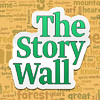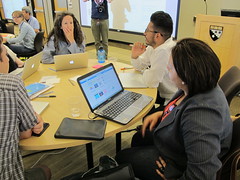Ed Tech determinism and so-called conventional wisdom
I am always suspicious of things that everyone agrees about – mainly because I usually find myself disagreeing. I would not be so arrogant as to believe that everyone else is wrong and I’m right, but I do often think that it would be good to evaluate what is taken as read in light of our personal experience and pedagogical expertise.
Here are just three examples of what I’m talking about.
9 Approaches to assessing Computing and ICT–#5: A Growth Mindset
In each case I have kept the text of the DfE’s announcement, and then added my thoughts under the heading “Applying this to Computing and ICT”.
Today: A Growth Mindset approach.
9 Approaches to assessing Computing and ICT–#4: A Mastery Approach
In each case I have kept the text of the DfE’s announcement, and then added my thoughts under the heading “Applying this to Computing and ICT”.
Today: A Mastery approach.
9 Approaches to assessing Computing and ICT–#3: A Scoring System
In each case I have kept the text of the DfE’s announcement, and then added my thoughts under the heading “Applying this to Computing and ICT”.
Today: A scoring system.
9 Approaches to assessing Computing and ICT–#2: The ladder
In each case I have kept the text of the DfE’s announcement, and then added my thoughts under the heading “Applying this to Computing and ICT”.
Today: The Ladder.9 Approaches to assessing Computing and ICT–#1: Skills Passport
The Story of the Story Wall App: an Apps for Good Success Story
 Emma, 14, describes how she and two friends created the Story Wall app.
Emma, 14, describes how she and two friends created the Story Wall app.
The Story Wall was created by me and my classmates Teigan and Joe. We originally came up with the idea to help people with writing stories and how people can get stuck when writing a story. The name was created by thinking how walls and stories are everywhere and how a story could be written on a wall, but the name just came to us and sounded right.
Coding is not debugging
5 principles of assessing computing and ICT
 There are lots of assessment grids and approaches being developed for the new Computing curriculum, which is wonderful. But how do you know which one is right for you? In this article I provide a few principles of assessment which I hope will provide some food for thought. These come partly from a course I’ve been teaching on the subject.
There are lots of assessment grids and approaches being developed for the new Computing curriculum, which is wonderful. But how do you know which one is right for you? In this article I provide a few principles of assessment which I hope will provide some food for thought. These come partly from a course I’ve been teaching on the subject.
These are general principles which I have applied to the context of computing and ICT.
5 Assessment for Learning techniques for ICT or Computing
 Here are 5 assessment for learning techniques you may wish to try out. They are generic, but I think they are especially useful in the context of Computing and ICT. As well as my own work and experience, I have drawn on
Dylan Wiliam’s book, Embedded Formative Assessment, Black and Wiliam’s Inside the Black Box.
Here are 5 assessment for learning techniques you may wish to try out. They are generic, but I think they are especially useful in the context of Computing and ICT. As well as my own work and experience, I have drawn on
Dylan Wiliam’s book, Embedded Formative Assessment, Black and Wiliam’s Inside the Black Box.10 ways to prepare for the new Computing curriculum
 With the new Computing Programme of Study looming on the horizon, schools do not have an enormous amount of time left in which to get ready for it. What practical steps can you take in order to be up and running in September?
With the new Computing Programme of Study looming on the horizon, schools do not have an enormous amount of time left in which to get ready for it. What practical steps can you take in order to be up and running in September?Computational thinking? Algorithms? Why all the jargon?
 The new Computing Programme of Study has been criticised not only for its content, but also for the terminology it uses. In particular, it speaks about “computational thinking”, “algorithms” and “decomposition”. “Surely”, the argument goes, “they could have used ordinary everyday language?”
The new Computing Programme of Study has been criticised not only for its content, but also for the terminology it uses. In particular, it speaks about “computational thinking”, “algorithms” and “decomposition”. “Surely”, the argument goes, “they could have used ordinary everyday language?”
Had “they” decided to do that, there would no doubt have had so many people panicking about it all. So, it’s a compelling suggestion. It just happens to be wrong.
The Internet of Things - The Inevitable Future?
 Zaneta Stepien explains what the Internet of Things is, and why we should be excited about it.
Zaneta Stepien explains what the Internet of Things is, and why we should be excited about it.
Technology never fails to bring us exciting developments and always promises to make our lives better. In recent years, there has been an explosion of technological creativity and innovation, with bold projects being undertaken in all corners of the Earth: from wireless power, 3D printing, gamification, autonomous vehicles and Automatic Content Recognition, to mobile robots and -- the topic of this post -- The Internet of Things, or, as some call it, The Internet of Everything. Sounds grand? Well, it's probably because it is. The promise of this enterprise is nothing short of game-changing,
The new Computing curriculum and its assessment is a great opportunity
(For the benefit of readers who don’t live in England, in September there will be a new Computing Programme of Study (ie the specification laid down in the National Curriculum), and schools no longer have to use “Levels” to assess pupils’ work.)
I was involved in a conference about preparing for the new computing curriculum recently (see Planning for the new Computing curriculum), and one of the delegates asked me:
“But what are we supposed to do about assessment now?”
“Well”, I replied. “Regard it as an opportunity.”
Cue guffaws of laughter.
Planning for the new Computing curriculum
 At first sight, it seems bizarre that despite the fact that many teachers urgently need professional development, and time, in order to be ready to teach Computing in September, headteachers are not always allowing them to attend courses during school time. A business planning approach by ICT leaders in school could help.
At first sight, it seems bizarre that despite the fact that many teachers urgently need professional development, and time, in order to be ready to teach Computing in September, headteachers are not always allowing them to attend courses during school time. A business planning approach by ICT leaders in school could help.
You may think that a business plan is not relevant to you because you’re not running a business. But actually, many of the things that a business has to do, like marketing and budgeting – and planning – are what you do have to do in one form or another. All a business plan is is a statement of where you would like to be at a certain point in the future, and what steps you need to take in order to get there.
9 Computing course providers to explore
The Amazing Computing Education Projects Book
Hour of Code Competitions
Here are three competitions in which you may be interested. I have not added any of my own comments or editorial, in the interests of posting this information as quickly as possible.
There are some exciting opportunities here: don’t miss them!
Useful ICT and Computing Conferences coming up
 With the new Computing Programme of Study looming on the horizon, there are a number of conferences and other events coming up in the near future. Here’s a list of some of them. The Education Show isn’t specifically about ICT or Computing, but there are seminars in those areas so it’s definitely worth looking at.
With the new Computing Programme of Study looming on the horizon, there are a number of conferences and other events coming up in the near future. Here’s a list of some of them. The Education Show isn’t specifically about ICT or Computing, but there are seminars in those areas so it’s definitely worth looking at.